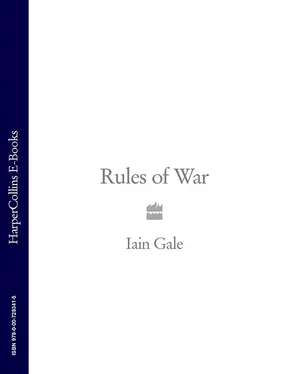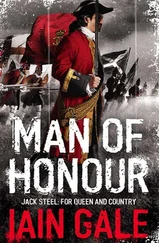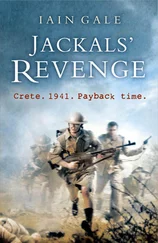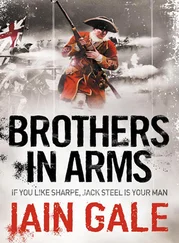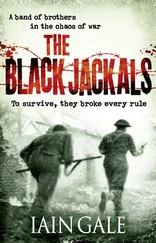‘Well, if you remember, Mister Hansam, sir, the order came from the duke hisself. And we had it direct from Lord Orkney. Press the right flank, says he. You may as likely find the ground just a bit soft there. That’s what he says, sir.’
‘A bit soft? Soft? Christ almighty, Jack. We’re advancing through a damned marsh. The men are coated in mud. Heaven knows how many have lost their weapons. It’s madness.’
Steel smiled. He turned to the younger officer. ‘Williams, you heard Lieutenant Hansam. Run along and tell My Lord Orkney that he has committed us to, um … to madness. There’s a good fellow.’
The ensign smiled, but did not move.
Hansam frowned: ‘Damn it Jack. You know what I mean by it. No general in his right mind would have an army advance across a bog like this.’
Steel laughed, and patted his friend on the back. ‘Of course, Henry, you’re quite right. You and I know that our commander-in-chief, His Grace the Duke of Marlborough, is the most brilliant general of our age. Tell me truly that you would not follow him to the death. Tell me that there’s not a man of this army who would not do the same. Of course it is not logical to send infantry into battle through a marsh. But since when did Marlborough ever fight by the rules? Was that how we won at Blenheim? Or on the Schellenberg? Now where the devil is our company?’
Looking about him he tried to make out more men of their company of Grenadiers through the mist. They were the tallest men in the regiment and it was not hard to spot them. He was aware of two men to his right and left, their scarlet coats discernible even in this gloom. But beyond them there were only shapes and voices. Somewhere off to the left lay the remaining nine companies of the regiment, and beyond them the bulk of the allied army under Marlborough. As was the custom, it was the honour of the Grenadiers to advance on the extreme right of the battalion, and as Farquharson’s was posted on the far right of the line Steel’s company now found themselves at the outer limit of the army. But at this moment Steel felt as if they might as well be on another continent.
As the snuff began to irritate his nasal passages, Hansam sneezed and spoke through his handkerchief. ‘You’re right of course, Jack. But we’ve been advancing now for close on two hours through this damned fog. For all we know the entire French army could be no more than a few yards directly in front of us.’
Slaughter coughed, respectfully: ‘Oh no, sir. We had his lordship’s word that the French was well to our front. Other side of that village, sir.’
‘Village?’ Steel replied.
‘Aye, a village. Which, were it not for this fog, you would see plain as day directly over there.’ Guessing, he pointed.
‘The village of Autre-Eglise. Our objective.’
Hansam strained to peer through the fog: ‘Damned strange name.’
The younger officer, Tom Williams, the company’s ensign, who until now had remained silent, spoke up eagerly: ‘It means “other church” in French, sir.’
Hansam smiled at him: ‘Thank you, Lieutenant. I was aware of that. But thank you all the same.’
Steel spoke: ‘So where d’you suppose the first church might be, Tom?’
Hansam smiled, and seized the opportunity: ‘Why, Jack, in another village, to be sure. Autre, Autre-Eglise, perhaps.’
‘Very droll, Henry. Now I think we had better follow the men, d’you not. It wouldn’t do for them to find the French before we do, eh?’
As the officers moved away obliquely to their left and front to find their platoon and they all began to advance as fast as the ground permitted, Steel contemplated how life seemed constantly to bring one full circle. He had come through the slaughter of Blenheim two years ago and last year’s bloody adventure in Spain only to find himself back here again on Flanders soil, where his soldiering had begun and where the British army always seemed to be. Flanders – where, at a godforsaken place called Steenkirk, he had first tasted battle, as a seventeen-year-old ensign.
He had been fourteen years with the colours since then and naturally he knew why they were really here now. Of course, Marlborough needed a victory. Blenheim seemed an age ago and their Dutch allies were becoming restless. Last year had seen no northern triumphs, just an endless succession of marches and counter-marches. True, they had broken the massive French lines of fortification which traversed occupied Belgium. But there had been no opportunity then to exploit that success with a victory in the field. Now, Steel knew, here and in London, Marlborough’s enemies were again intriguing against him. The only answer was a victory. So, they were here to beat the French and if that meant crossing this filthy bog, then that was what they would do. Snapping back to the matter in hand, he grew aware now that, with every step forward they took, their line of battle was becoming increasingly ragged.
He turned to Slaughter: ‘Try to dress the line, Sarn’t – wherever it is. We can’t afford to lose any men before we’ve even found the enemy.’
‘Right you are, Mister Steel.’
Steel sighed: ‘And Jacob, do try to just address me as “sir”. At least allow me the appearance of being a captain.’
Steel, although promoted to captain after Blenheim by Marlborough himself, had not yet had the field promotion ratified by the high command at the Horse Guards. That had been two years ago and now he had almost given up hope. He could only presume that he was out of favour at court and he did not need to guess at the reason. He had a lover in London – if that were the right term for someone with whom you had fallen so surely out of love. Arabella Moore was a jealous mistress, ten years his senior and so dangerously close to the queen as to be able to deny him his captaincy. Doubtless Arabella had heard of the romance that Steel had forged in the days before Blenheim, a liaison with a pretty Bavarian girl who he had hoped might bring him lasting happiness. But now Louisa Weber was beyond his reach. On his return from Spain he had found her married to an officer in the Royals. Well, in truth, he too had not been over-faithful to her and so it was for the best. But it had not prevented Arabella’s jealousy, nor her continuing spite. Clearly, if she could not have him, then she was determined at least to block his advancement in the army.
What, Steel wondered, would he have to do to achieve on paper the promotion he had earned and now so urgently needed? The bounty from Blenheim and most of that he had gleaned in such danger in the previous year’s campaign had dwindled all too fast. Very soon he would again be in serious debt. Pursued yet again, no doubt for the endless round of an officer’s expenses and mess bills by their assiduous regimental adjutant, Major Frampton. He prayed that this coming fight might yield an opportunity for fortune and glory for, in his experience, one seldom came without the other. And neither could be achieved without that danger to which Steel was now so helplessly addicted. For, despite all his horrors of phantoms in the mist, he knew that it was the thrill of beating fate which made him a soldier; the knowledge that at any moment he could be killed or horribly mutilated and the unparalleled exhilaration which came after a battle, that delirious moment when you knew that you had cheated death, once again. There must now be an opportunity for him to impress again, to bring himself to the attention of Marlborough and even the queen herself. He would be gazetted captain.
A voice brought him back to the present. Slaughter cocked his musket: ‘Rider, sir. Coming from our left.’
Again, instinctively, Steel’s hand closed around the grip of his sword and he made to draw the blade.
Читать дальше
